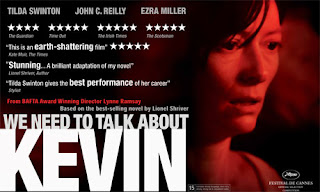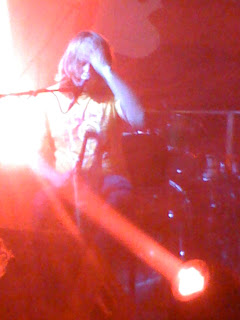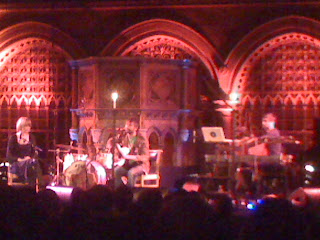

These two films, which I watched back-to-back today in an influenza haze, are both about sojourns in dream-spaces; both almost sermonizing in their lessons about the education of a more-or-less deliberate journey to a radically different reality. Both holiday films, more or less.
Stalker (on both watchings; I saw it, mesmerised, 3 years ago) has lost none of it's war-reporter power. Everything in the film is cracked, flooded, rotten, decayed, abandoned, broken, deserted. The dream-destination is alive with shards, a silent and oddly benevolent dog, crumbled objects, bird-sound, drips and splashes of unseen water, the occasion far-away train, leaving the complaints and dissatisfactions of the seekers-after all the more isolated and pathetic.
The breathing-in of the three men, particularly the Stalker himself, is raspy, laboured, shallow, a festival of effort and dried, cracked discomfort. Travelling toward something as undeniable and burdensome as everything-they-ever-truly-wanted at the centre of the Zone, the effort of speech is difficult to muster up. It's striking on a second watch, how little there is to say about the relationships between the three men, given that they spend more than 2 hours of screen time in the same, long shots together.
If Stalker is a film about desire and locality, then Spirited Away is it's sister movie about rite of passage and social locality. There are the apparently-obligatory ectoplasmic monsters and preposterous plot holes but a ghostly and hallucinatory visual imagination at work; the submerged train tracks, Kumajii's arachnid limbs, the almost nauseatingly plummy bath-token manager Aogaeru.
The theme of submerging as a transitory device is common to both; one of the few still, slow visual moments in Spirited Away that isn't ruined by truly dreadful American dubbed dialogue or brutal plot gear-changes is the over-the-sea train, it's tracks a couple of feet below the surface, station platforms rising out of the water like dreams of their own. Tarkovsky uses languid pans across detritus drowned in low pools, usually sunken tiled surfaces, mildewed and cracked, as staging posts within Stalker. His very-slightly-hokey loudly Oriental wind instrument is heard here too, signalling a respite from the brutal visitation of the unknowable within the spaces the men inhabit.
Both travellers come home, both to their families (weirdly after the passages they've endured), and neither seem likely to return.

 Helvetica suffers when seen soon before Urbanized, because of the distractions of sets in an endless parade of selfconsciously designed offices (of typeface and graphic designers), and the ever-present risk of nerdish obsessing over micro-detail. It's most successful interviewees are Erik Spiekermann, whose spiky and arch asides mark him out from the faintly childish miasma surrounding most of the designers (Paula Scher ludicrously attempts to align a comfily boho 60s New York cultural touchstone with opposition to the war in Iraq; David Carson talks like a shambolic surfer) and the relaxed yet rigorous commentaries of Dimitri Bruni and Manuel Krebs. They are the only interviewees who actually reach the point of saying what a few others hint at or do not have the language to say: You can only say what your typeface will let you say, or wants to say.
Helvetica suffers when seen soon before Urbanized, because of the distractions of sets in an endless parade of selfconsciously designed offices (of typeface and graphic designers), and the ever-present risk of nerdish obsessing over micro-detail. It's most successful interviewees are Erik Spiekermann, whose spiky and arch asides mark him out from the faintly childish miasma surrounding most of the designers (Paula Scher ludicrously attempts to align a comfily boho 60s New York cultural touchstone with opposition to the war in Iraq; David Carson talks like a shambolic surfer) and the relaxed yet rigorous commentaries of Dimitri Bruni and Manuel Krebs. They are the only interviewees who actually reach the point of saying what a few others hint at or do not have the language to say: You can only say what your typeface will let you say, or wants to say.






































